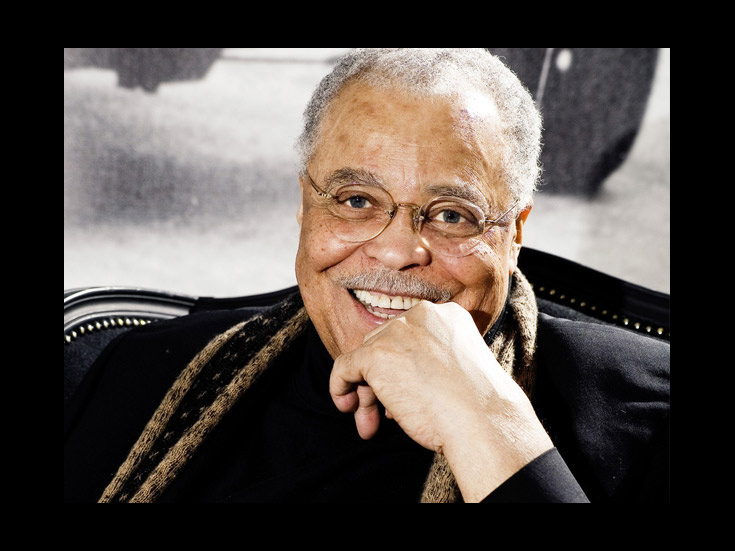Tony Nominee James Earl Jones on Four Decades of Great Performances, from Othello to The Best Man
What could be better than hearing the great James Earl Jones ruminate on six of his favorite roles? At age 81, Jones just picked up his fourth Tony nomination for his sly performance as former U.S. President Arthur Hockstader in The Best Man. It’s not easy to edit the reflections of a titanic talent like Mr. Jones, so enjoy this super-sized Role Call, including Jones’ thoughts on why Othello should waterboard Iago and memories of August Wilson, Harry Truman and more.
 Role Based on a President I Met
Role Based on a President I Met
“The character I’m playing now [former President Hockstader in The Best Man; 2012 Best Actor Tony nomination] is based on the man who dropped the [atomic] bomb—let’s start with that. He learned about power in the worst way. How does he live with that? Very easily, because he knows how to compartmentalize. I actually met Harry Truman when I did my first political play, Sunrise at Campobello [in 1958]. Eleanor Roosevelt and Truman were invited to see it, and he visited us during rehearsal. Hockstader is from Indiana, the heartland of America, and I understand what that means: I was born in Mississippi but raised in Michigan. A man from a farm in Indiana sees the world differently than a man from a college campus in the east. As John [Larroquette] plays [presidential candidate] Russell, he contemplates a lot, and that bothers Hockstader. I think Obama would bother Hockstader, too; he likes the younger candidate’s [played by Eric McCormack] tendency not to hesitate. Hockstader knows he’s not as smart as anyone else on that stage, but he’s got something else working for him, and that’s instinct and honesty. I’m not sure if I agree with the character on everything, but I like him.”
 Role With the Best Values
Role With the Best Values
“Hoke [the chauffeur in Driving Miss Daisy; 2010] is the opposite sort of human being [from President Hockstader]. He’s a man who has no intellect at all, but he has a good set of values and an innate common sense that’s very sharp. The people who upheld segregation in the south were hypocrites, and Hoke knew that. But he also knew how to work with them, because it was the only source of employment. I enjoyed the character immensely because I have that in quality in me, too—I can get along with people. It doesn’t cost a lot to be civil! I was inspired by [Morgan Freeman] the actor who played Hoke in the film. He should have been given an Oscar, as [Jessica Tandy] was. The real Hoke fulfilled his dreams: He knew that education was the answer for black people in the south, and his job was to support his family through college. I met two of his grandsons, who are very erudite people.”
 Role That Inspired a Tony-Winning Pantomime
Role That Inspired a Tony-Winning Pantomime
“I call Troy in Fences [1987 Best Actor Tony Award] ‘the man who is wanting’ because he wants everything and deserves nothing. The audience loves him in the first few scenes because he’s funny. But when he becomes a philanderer and a bad guy, the audience hates him, women especially. He’s an ex con who is jealous of his own son’s education and chances to succeed in life. The best advice I’ve ever heard is when his son says, ‘Why is it you never liked me?’ And Troy says, ‘Like you? Who the hell ever said I had to like you? If you go out in the world expecting people to like you, you’re in real trouble.’ The way Courtney Vance [as Troy’s son, Corey] played that scene was heartbreaking. August Wilson and I didn’t talk much. That’s OK. My communication is through the director, and Lloyd Richards knew August very well. He even knew that August did not want to rewrite. There was a moment in the play when the two men have their showdown, and the mother walks in and resolves it with a speech. I knew that was wrong. The conflict is: Does that father hate his son enough to kill him? They have to solve that before the play can go on. August said, ‘I can’t write that.’ I begged Lloyd to help, and he did it by letting us pantomime the battle over the [baseball] bat. When the boy offered his head to be bashed by his father and the father couldn’t do it, that was the resolution. It was great of August to let us do that without dialogue, and great of Lloyd Richards to find a way.”
 Role I'd Like to Be Remembered For
Role I'd Like to Be Remembered For
“If I ever wanted to have something as my legacy in film, Cry, the Beloved Country [1995] would be at the top of the list so far, above The Great White Hope or anything else I’ve done. For many years, Alan Paton’s [1948] novel was the only information we had about South Africa during apartheid. Athol Fugard wasn’t published then, so American students read Cry, the Beloved Country. It’s a quite a poetic piece; I had seen Canada Lee and Sidney Poitier do an underground version of it. I played Stephen Kumalo, a preacher whose family is falling apart as he makes a journey into the urban world. Charles Dutton played the other side of humanity, the radical, ambitious side, and my character is a man of peace, although he has his own faults. It was not a successful film for reasons I won’t go into, but we had a good cast of white and black South Africans who believed in the story and gave their soul and energy to make it work.”
 Role That Is Often Misunderstood
Role That Is Often Misunderstood
“The production of Othello that worked best for me was the one I did with my first wife [Julienne Marie, in Central Park, 1964] as Desdemona. Mitchell Ryan played Iago, and he and I were very similar in size, similar in zodiac signs [Capricorn], similar in temperament. He was white and I was black, but otherwise we were like brothers, and that’s how we played those characters. Iago was the jealous one, not Othello, and he infected everybody else. What I’ve learned with this play is that at some point, Othello has to take responsibility. The worst thing that can happen is to have Othello come off looking like a victim. He’s not a dupe, he’s a very wise man. When he begins to have a suspicion, and challenges Iago to tell him the truth, he’s got to waterboard Iago to force him to say what’s on his mind. When I say ‘waterboarding,’ I mean that literally—when I heard Dick Cheney rationalizing waterboarding, I realized that this ancient method of torture is exactly what that moment needs. The production I did on Broadway with Chris Plummer [in 1982] was a mess. We went through a number of Desdemonas; Zoe Caldwell took over the direction and my wife [Cecilia Hart] came in as we hit Broadway and helped resolve some of the problems, but it wasn’t enough.”
 Role That Was Most Meaningful
Role That Was Most Meaningful
“I love the character of Lennie in Of Mice and Men. He is devoid of reflective thought. All he can do is kill little creatures accidentally. His affection is so strong that he starts caressing them too hard; they die, and he doesn’t understand why. When he kills a woman, he does it out of panic because he knows he is going to catch hell. I had done the play several times, once with my father [Robert Earl Jones] at Purdue University [in 1967]. I understood the character even more in the production I did on Broadway with Kevin Conway as George [in 1974]. He and I did a lot of research. The minute Kevin walks onstage with me in that opening scene, he knows that at some point he is going to kill me. That’s his destiny: He has been put in charge of this other person’s life, and he’s also in charge of when and how that life stops. He accepts that responsibility and becomes a tragic hero.”
 James Earl Jones
James Earl Jones

